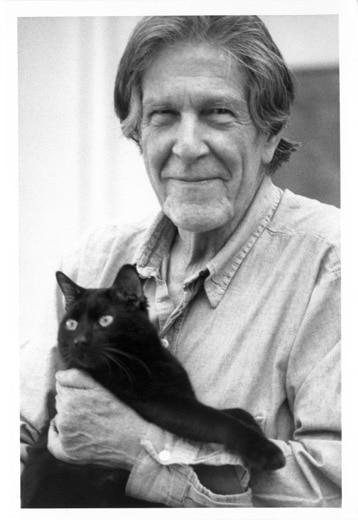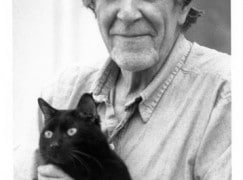Tim Page nails John Cage
mainIn his first work of criticism since suffering a brain injury 15 months ago, Tim Page shows in a single paragraph why he’s still one of the best. From his review of the John Cage Letters in the NYRB:

If I rarely listen to John Cage, I listen through him constantly. I teach a graduate course in writing about music at the University of Southern California. At some point, late in the semester, after the traditional exercises are finished, I ask my students to walk out into the sunshine, to find music of any kind (if they call it music, I’ll accept it as music), to write a couple of paragraphs about what they’ve heard, then to come back to the classroom and read their work aloud. The subjects may vary from the sounds of a guitarist playing under a tree to the tintinnabulation of the practice rooms to the sounds of fountains, birds, and the cars and buses turning from Hoover Street onto Jefferson Boulevard. After listening to the world for half an hour with music in mind and pouring the experience into a narrative, the students are eager to read, talk, dispute, defend, and wonder about the very nature of creation. Such a question is Cage’s gift to us and it is a very real one.
What ore do you need to know?
Read on here.






‘What ore do you need to know?’
Haematite, perhaps?
Opening your ears to the world is what young children do. If you need to do that later in life, something went wrong.
how bleak a statement. it’s not a question of opening your ears (or eyes, or mind, or heart) but keeping them open throughout your life. and it’s never too late to do so.
It clearly is too late for Borstlap, as Zen concepts clearly are too elusive for his fossilized mind. Sclerosis of the soul is a sad thing.
Beautiful thoughts from Tim, as always.
I’m a great lover of Zen. What is the sound of nonsense?
I should have been more clear.
“…… but keeping them open throughout your life. and it’s never too late to do so.” I fully agree – but when you need John Cage to do so, of all people – this clownesque decomposer – something went seriously, gravely wrong with your cultural upbringing. It’s like pitching first to the garbage bin in a park in an attempt to enjoy nature.
Sounds like Mr Borstlap forgot how.
Bad for you if you think that any sound is Music, or that any ready-made is Art.
But imagine what your life could be if you listened to the world as if it were all music.
If any/every sound were music then there would be no music as we know it. Cage’s aesthetics (and I am well acquainted with it) is a way to interact with the world, not to listen to music.
Correct.
Somewhere in the eighties, Cage was invited by Dutch radio to fill an entire day with his ‘music’. He produced a wide range of sounds, like the sounds of water bubbling in a nautilus shell when moved, and the plinky plonk of cactus needles being plucked, but music there was none.
If everything is a work of art, nothing is.
^ Because of course if you experienced the world this way, you would give up all powers of discrimination. Life would be sweet, but most likely short: you would probably walk in front of a bus because you were too caught up in the rhapsodic music it made to know any better.
Yep. That’s pretty much definitely what would happen.
That’s not what Page says. He invites his students to listen to the world for half an hour “with music in mind”, then to write about it and talk about. That is not the same as saying that any sound is music; he is more discriminating than that. BTW it’s a fine cat.
Tim Page is just inviting his students to experience a Cagean concert. It can be a wonderful experience for once, but quite unpractical for normal daily life. And I prefer Beethoven, no doubt about this point.
I certainly agree with your last sentence!
Beethoven wrote all the notes that Cage carefully left-out.
By the way, is anyone certain that Cage was not a fraud? If so, direct me to a composition of his that requires no explanation as to its worth, and that I would listen to more than once.
There is none.
What Cage’s works actually do, is giving entirely unmusical people without any cultural leverage the feeling that they can still take part in something cultural without having to do something for it, so: underdevloped, lazy people, who recognize in the futile emptiness of these works something of themselves, something that confirms their identity. This experience is very uplifting, like absolution being administered by the catholic church…. ‘you are fogiven your lazy state of mind and can still be part of avantgarde culture’. In the end, phenomenae like Cage’s are rather like a faint, perverse religion than art.
If there are readers left whom I have not as yet offended, I sincerely apologize.
“Get yourself out of whatever cage you find yourself in.”
John Cage
Funny…. he did not find himself in a cage because he was one himself.
Music cannot be simply reduced to the rather sad idea of any sound that may possibly occur in the world (I really wonder where one draws the line with such an idea, or if there is a line at all), but rather tends to be the organization of sound and pitch in a manner that is aesthetically pleasing and, in rare cases, spiritually meaningful — just as a written text, too, is a specific organization of letters and is never reducible to an arbitrary combination of letters. If I write here “ajoglembo fjoew nowjdkgle,” one may well find such statement wonderful and perhaps quite fashionable in certain circles, but I suspect such an assessment might rather be disingenuous, for it is wholly unintelligible. There are actually a few pieces by Cage that are well done, such as the Sonatas and Interludes for Prepared Piano, but there is a lot of work that is truly vacuous and which, I suspect, would not enjoy any sort of recognition were it not for the fact that his name is associated with it (the same goes for a great majority of today’s contemporary music). Just because one might want to feel in touch with the current Zeitgeist does not mean that any work which breaks with tradition is actually good. In fact even those composers (i.e., Strauss, Stravinsky, Debussy) who clearly broke with tradition were still indebted to it and well versed in it. There is a reason why the works of Bach, Shakespeare or Plato (and many others) still speak to us today: they make a lasting claim, something which cannot be said for much of classical/contemporary music written roughly in the past 50 years, save for a few exceptions which tend to write in a tonal, or tonally reminiscent, language. Being supposedly “progressive” should not mean accepting or giving legitimacy to works which may have absolutely no musical value simply for the fact that they claim to be transgressing boundaries and/or that they happen to be in vogue. No, the sound of a squeaking door is not music, and I fail to see the supposed “gift” in such an idea.
All true.
The architect Leon Krier said of classical art that it is atemporal, like mathematics. If we understand the term ‘classical’ as being based upon the holistic nature of human perception, which is built-in in our system. Boundaries of this perception cannot be transgressed without damaging the receptive framework.
Nice interview typed up between Bruce Duffie in Chicago and John Cage – you’ll soon find out if he’s in a cage or not – ha, ha!
http://www.bruceduffie.com/cage.html
The interview reads as something concocted together by teenagers. It has nothing to do with culture or music, but is entirely in the realm of concept art, in this case: concept music, or sonic art. Nice, fun, interesting if you are in that sort of thing and have no requirements of intellectual or cultural meaning, but as for music, entirely irrelevant.